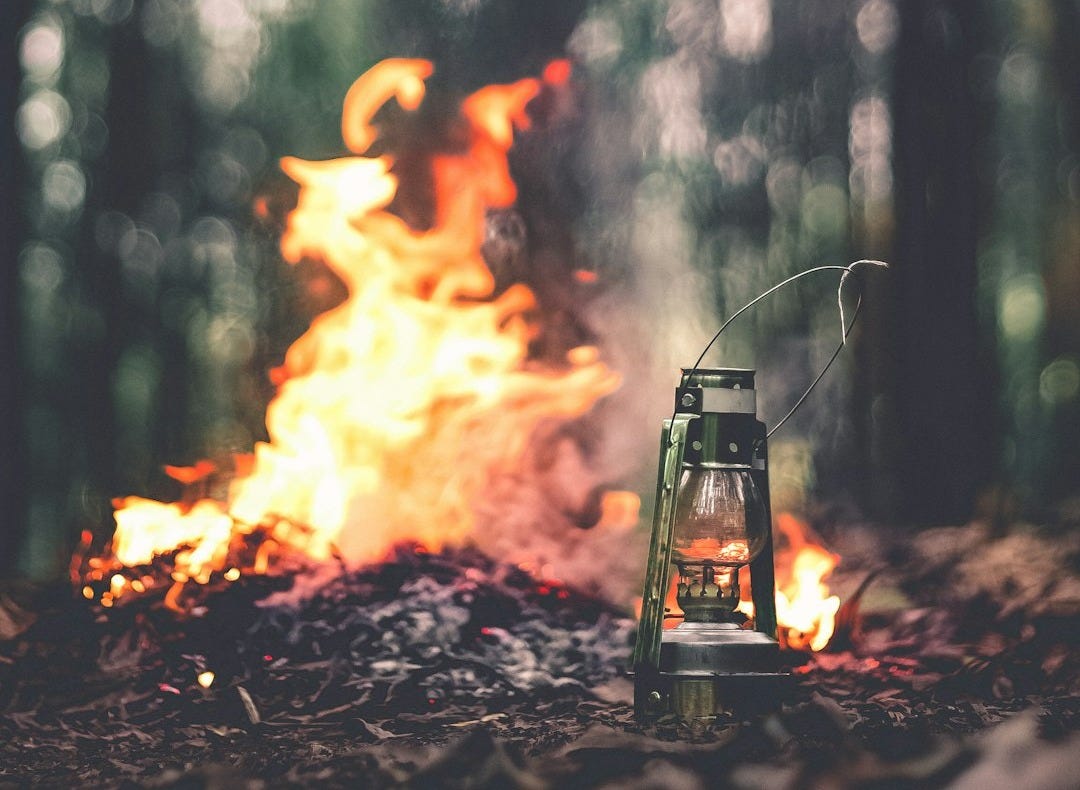Good morning. Happy Friday and the last day of February!
Is there a gentle way to sound the alarm? Today, we discuss comfort prepping and next-level prepping. Things are happening in this country that will very soon show up on your doorstep. We’d all benefit from adopting the Scouts’ motto of “Be Prepared.”
Glad you’re here.
The Comfort Prep No One Talks About
When people think about preparedness, they focus on food, water, flashlights, and first aid. But what about the things that make tough times feel a little less awful?
Imagine a power outage, a supply chain issue, or just a stressful week. What small comforts would make a difference?
📖 A real book (not just your Kindle)
🍫 Your favorite snacks (because morale matters)
🛋️ A cozy blanket that makes you feel secure
🍽️ A handwritten list of recipes in case Wi-Fi is down
🎧 Extra chargers and headphones for sanity’s sake
Keep the things on hand that bring you joy for when things get weird.
Feature Article 👇

Next-Level Preparedness
A couple of weeks ago, we discussed low-key prepping—those small, everyday preparedness steps that save you time and stress when things go sideways. Today, let’s build on that foundation and look a little further down the road.
Because let’s be honest: the world feels more unpredictable than ever. If that’s news to you, you might want to start double-checking your sources. And yes—keeping up with the news can be exhausting, frustrating, and overwhelming. Some people make the case that they’re protecting their mental health by tuning out politics. But here’s the thing: preparedness should give you peace of mind. Because the antidote to anxiety is action.
Wouldn’t you rather see what’s coming so you can get ready?
Right now, we’re witnessing the dismantling of government agencies and protections that safeguard our health, finances, and civil rights. History tells us that moves like these don’t end well. But instead of dwelling on worst-case scenarios, let’s focus on what we can control—practical, realistic steps to insulate ourselves (as best we can) from instability.
Here’s how you can shore up your financial security, personal health, and daily life in ways that feel proactive, not panicked.

1. Financial Readiness: Protect Your Money, Your Identity & Your Future
If there’s one thing we know about economic uncertainty, it rarely announces itself with a warning. And with shifting leadership in government agencies, widespread layoffs in public services, and major changes in financial oversight, now is a good time to lock in protections for yourself and your family.
✅ Print Your Credit Reports
With the potential for massive disruptions in financial oversight, fraud prevention may fall to individuals rather than institutions. Print out credit reports for every member of your household—even your kids. This ensures you have a physical record in case of fraudulent activity, identity theft, or missing account data.
Where to get them? The official source for free annual credit reports is AnnualCreditReport.com, which lets you access reports from Equifax, Experian, and TransUnion.
✅ Settle Debts (But Stay Liquid)
If you’re in a position to pay down high-interest debt, consider doing so now. Economic downturns often disrupt credit access or increase interest rates.
At the same time, keep cash highly liquid—whether in an accessible savings account or on hand in small denominations. If systems go down (or just slow down), having immediate funds available is key.
✅ File Your Taxes ASAP
Government agencies—including those responsible for processing refunds and tax records—are in flux. If you’re owed a refund, file as early as possible to reduce the risk of delays or disruptions.
✅ Be Smart About Big Purchases & Travel
Now might not be the best time to take on large, non-essential financial commitments. This isn’t about living in fear—it’s about keeping your options open.
Reconsider major purchases unless they’re essential.
If you’re traveling, check refund policies, cancellation terms, and have backup payment methods in case of system outages.

2. Health Security: Stock Up & Stay Ready
If the last few years have taught us anything, supply chain disruptions can happen fast. Medicine shortages, delayed shipments, and overwhelmed healthcare systems are real possibilities. A little health preparedness now can save stress (and money) later.
✅ Schedule a Full Health Check-Up
Even if you feel fine, a routine visit now could help prevent bigger health concerns later. Plus, if access to healthcare becomes more complicated, you’ll be ahead of the game.
At your next appointment, consider:
Updating any missed vaccines (especially tetanus, flu, or shingles if you’re eligible).
Asking for a 90-day supply of critical medications if your insurance allows it.
Refilling prescriptions early whenever possible to have a buffer supply.
✅ Build a Small Medical Stockpile
No need to hoard—just have the basics on hand:
✔️ Pain relievers (ibuprofen, acetaminophen)
✔️ Allergy meds (antihistamines, decongestants)
✔️ Cold/flu treatments
✔️ Bandages, antiseptics, and wound care supplies
✔️ Electrolyte packets for dehydration
✔️ Any personal essentials (inhalers, EpiPens, glucose monitors, etc.)

3. Everyday Stability: Practical Steps to Stay Grounded
Preparedness is having what you need to function normally, no matter what’s happening around you.
✅ Keep Your Car in Good Shape
Even if you don’t drive much, having a reliable vehicle with a full tank of gas can be a lifesaver in unpredictable situations.
✔️ Get your oil changed and tires checked.
✔️ Keep at least half a tank of gas at all times.
✔️ Store a paper map in your glove box in case GPS goes down.
✅ Make Sure You Have These at Home
A simple beyond-3-days supply to have the basics covered if stores close or deliveries are delayed:
Non-perishable foods (rice, canned goods, nut butters, protein bars).
Drinking water (or a filtration method like a Brita or LifeStraw).
Household essentials (toilet paper, soap, laundry detergent).
Batteries & power banks for phones and flashlights.
Alternative light sources (candles, solar lanterns).
✅ Check In With Your Network
We’re all in this together. Talk to family, friends, and neighbors about mutual preparedness. Maybe one friend is great with first aid, while another is a budgeting expert. Pooling knowledge and resources makes preparedness easier—and less overwhelming.
Prepared, Not Paranoid
There’s peace of mind in knowing that, whatever happens, you have a plan. The goal is to live your life fully, knowing you have the tools to handle uncertainty.
Because no matter what comes next, you’ve got this.
Pick one thing from this list and do it this week—even if it’s as simple as downloading your credit report, filling a prescription early, or keeping an extra 20 bucks in cash.
Small steps add up, so you can feel calm, capable, and ready for whatever’s next.




